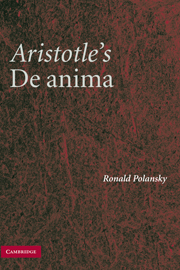Book contents
- Frontmatter
- Contents
- Preface
- List of Abbreviations
- Introduction
- COMMENTARY ON DE ANIMA: : Book 1
- COMMENTARY ON DE ANIMA: Book 2
- COMMENTARY ON DE ANIMA: Book 3
- 1 In the World As It Is There Can Be but the Five Senses
- 2 What Allows for Perceiving That We Perceive; Sense Joins in a Common Power so That the Five Senses Are Subfaculties of a Central Sense Faculty
- 3 Distinguishing Sense and Thought; What Is Phantasia?
- 4 What Is Mind as That Capable of Thinking All Things
- 5 What Enables Thinking to Occur
- 6 The Sorts of Intelligible Objects
- 7 Phantasia Has a Role in All Thinking
- 8 That Mind Can Think All Things
- 9 There Is a Capacity for Progressive Motion
- 10 The Desiderative Capacity Is the Primary Cause of Progressive Motion
- 11 Even the Simplest Animals Have Indefinite Phantasia, and Calculative Phantasia Fits the Account of Progressive Motion
- 12 The Necessary Order of the Faculties of Soul
- 13 The Sort of Body Requisite to Support the Order of the Faculties of Soul
- Bibliography
- Index
13 - The Sort of Body Requisite to Support the Order of the Faculties of Soul
Published online by Cambridge University Press: 18 December 2009
- Frontmatter
- Contents
- Preface
- List of Abbreviations
- Introduction
- COMMENTARY ON DE ANIMA: : Book 1
- COMMENTARY ON DE ANIMA: Book 2
- COMMENTARY ON DE ANIMA: Book 3
- 1 In the World As It Is There Can Be but the Five Senses
- 2 What Allows for Perceiving That We Perceive; Sense Joins in a Common Power so That the Five Senses Are Subfaculties of a Central Sense Faculty
- 3 Distinguishing Sense and Thought; What Is Phantasia?
- 4 What Is Mind as That Capable of Thinking All Things
- 5 What Enables Thinking to Occur
- 6 The Sorts of Intelligible Objects
- 7 Phantasia Has a Role in All Thinking
- 8 That Mind Can Think All Things
- 9 There Is a Capacity for Progressive Motion
- 10 The Desiderative Capacity Is the Primary Cause of Progressive Motion
- 11 Even the Simplest Animals Have Indefinite Phantasia, and Calculative Phantasia Fits the Account of Progressive Motion
- 12 The Necessary Order of the Faculties of Soul
- 13 The Sort of Body Requisite to Support the Order of the Faculties of Soul
- Bibliography
- Index
Summary
Aristotle has justified the succession of the crucial powers of soul, nutrition and sense perception, and in the case of the latter both contact and distance senses. He has justified them functionally – that is, they are necessary and along with suitable bodily apparatus sufficient for accomplishing vital functions or ends of the living organism – and in this way he has demonstrated the accidents of the soul as following necessarily from the definition of the soul and its faculties (see 402a7–10). The operations of the living beings that are the accidents of being ensouled are relatively obvious, even if they require demarcation, so that it merely has to be established that the capacities of soul accomplish them, in conjunction with the body, and are needed to accomplish them. Thus, these faculties conduce to the plant or animal's nature being for the sake of something. The senses are necessary and sufficient for bestowing animal life upon a suitable body, and the contact senses primarily so.
Previously Aristotle suggested that plants among living things have a body too simple to support the sense of touch (434a27–28), and in setting out to prove that touch is necessary for animal life he contended that touch supposes a body that is not simple (434b8–11). He has yet, however, to argue against overly simple bodies for animals. Now he provides the argument for his earlier claims that too simple bodies will not uphold a sense of touch necessary for animal life.
- Type
- Chapter
- Information
- Aristotle's De AnimaA Critical Commentary, pp. 546 - 554Publisher: Cambridge University PressPrint publication year: 2007



